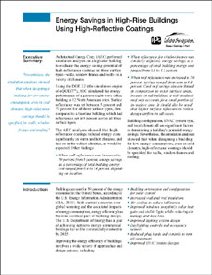Mar 21 2011
PPG Industries’ (NYSE:PPG) coil and extrusion coatings group has issued a white paper demonstrating the superior energy performance of buildings with infrared (IR)-reflective coatings on metal walls, window frames and roofs.
The 12-page document, Energy Savings in High-Rise Buildings Using High-Reflective Coatings, summarizes an energy modeling study conducted by an independent energy and environmental analysis firm on prototype eight-story office buildings in 12 North American cities.

The study showed that, when IR-reflectance for metal wall, window frame and roof coatings was increased from 5 percent to 70 percent, total building energy costs were reduced by 1 percent in cold-weather cities such as Boston, Chicago and Ottawa, and by up to 4 percent in warm-weather cities such as Mexico City and Phoenix.
The study showed that cooling loads for prototype buildings were cut by 2 percent or more in cold-weather locales, and by as much as 7 percent in sunny climates. Size requirements for fans and air-handling units (AHUs) also were diminished by 3 to 7 percent.
The study concluded that “the small premium paid for heat-reflective coatings [compared to standard fluoropolymer coatings] pays for itself many times over in energy savings for the building owner … even in cold climates.”
In addition to combined savings for high-reflectance walls, window frames and roofs, the white paper details energy and equipment size reductions for each as individual components, and for escalating reflectance levels from 25 to 65 percent.